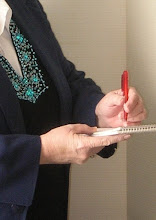I asked John Berlau, policy analyst at the Competitive Enterprise Institute in Washington, D.C. to look at HB 301 and comment on how this law would affect the mom-and-pop locksmith businesses if this law passed in Florida. Berlau is a frequent guest on Fox News’ “Your World with Neil Cavuto,” CNBC’s “The Call” and “Closing Bell” and MSNBC’s “The Situation” with Tucker Carlson. Besides television and radio broadcasts, Berlau writes for numerous news publications such as the Wall Street Journal, Barron’s and Investor’s Business Daily. He is the Director of the Center of Investors and Entrepreneurs for CEI and graduated from the University of Missouri with a degree in journalism and economics. For more information about Berlau and the Competitive Enterprise Institute, go to http://cei.org or www.cei.org.
Barbara Martin: So, Mr. Berlau, what did you think about the pending locksmith law in Florida now that you’ve had a chance to analyze it?
John Berlau: Nobel Prize winner in Economics Milton Friedman had written that the real effects of licensing, though often justified by proponents in the name of safety and security, is to serve the self-interest of members of a powerful industry group and to lock out competition. This group will then raise the rates, raise the wages and raise the prices to the advantage of the group benefiting from the law.
It seems like what Friedman wrote fits this bill.
The big issue is that the costly hours for mandatory training puts up a barrier for competition, raises prices for consumers and may actually be unconstitutional.
There are definitely some constitutional issues here. The Fourteenth Amendment states that individuals cannot be deprived of life, liberty and property without due process of law. To practice your trade is a liberty and this bill takes that away without due process of law and it just states that you can’t be a locksmith. There have been some court challenges based on this amendment and recently courts have been friendlier to economic liberty.
Martin: The Associated Locksmiths of America (ALOA) has provided the framework for the bill including the mandatory training. You can see a sample bill on their site which they make available for local locksmith associations to present to legislators as a guide. All they really need is one association in the state to work with them. While there are thousands of locksmiths in the state of Florida (estimates of about 3,000*), ALOA only lists 234 Florida members on its site (268 if you count duplicate business listings), yet ALOA’s members and their certified trainers in Florida are spearheading and pushing the legislation probably because a good part of their income is derived from providing training programs and trainers.
Berlau: ALOA should operate like AAA (the American Automobile Association) and other organizations in their ratings of businesses such as hotels. It is fine for ALOA to perform such a service, but as with AAA hotel ratings, it should be voluntary. ALOA is free to advertise to the market, to make the case to consumers that its members who complete their training are more qualified. They are free to use that power of persuasion, but they shouldn’t use the power of big government to both coerce locksmiths and consumers into their cartel and fill their coffers.
Martin: Another reason, no doubt, ALOA is involved is because of the locksmith scammer problems we’ve had, although with the arrest of a major player, call center owner David Peer in November, that problem seems to have to subsided. I’m seeing more legitimate locksmith ads and listings on the Internet and the phone directories are working on the problem as well. The latest books I received had no scammer advertising in it, but the listings still needed work.
Berlau: These problems all get into the issue of fraud. You wouldn’t need all this required training to solve fraud problems. All that’s needed are the false advertising laws already on the books. There are going to be scam artists out there. This law affects the law-abiding. They just need to beef up the fraud laws or enforce the laws already on the books. I’m sure Florida has a number of fraud laws on the books, bait and switch, - whatever - you can get them on any one of those laws and if they cross state lines it would involve federal laws.
Ultimately, Florida locksmiths should have the liberty to practice their trade without unreasonable restrictions. It seems all that would be necessary would be a simple background check to prevent criminals from becoming locksmiths.
While I generally believe that fingerprinting violates privacy rights, civil liberties and the Fourth Amendment’s prohibition of unreasonable search and seizures, there is an issue of public safety here. Still, I’m not sure if the safety interests here justify fingerprinting. If fingerprints are collected, though, access to the fingerprint registry needs to be strictly controlled to prevent abuses.
Martin: Thank you so much for your interview. You've effectively defined what a lot of locksmiths are saying and feeling.
Berlau: Anytime. Please keep me informed. This is an issue CEI would like to follow.
*Note: One good thing about blogs is that when you make a mistake you can fix it quickly. I previously over estimated the number of locksmiths in Florida. The number is closer to 3,000.
Saturday, March 27, 2010
National policy expert gives pending Florida locksmith law a thumbs down
Subscribe to:
Post Comments (Atom)


Very informative!I like the way Mr. Berlau pointed out things on that issue!
ReplyDelete